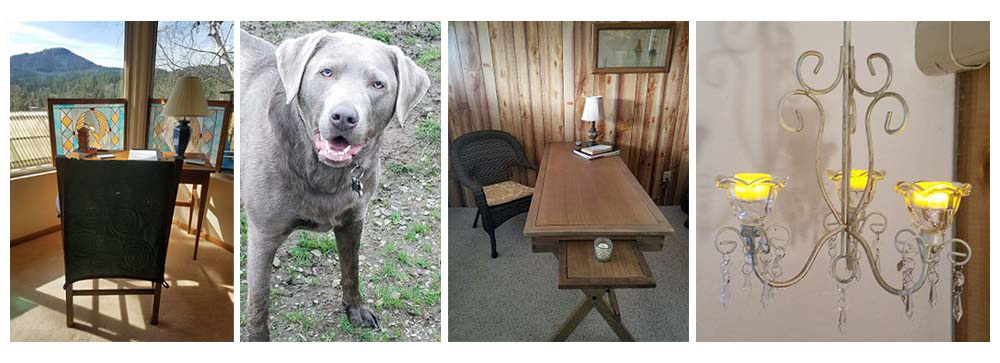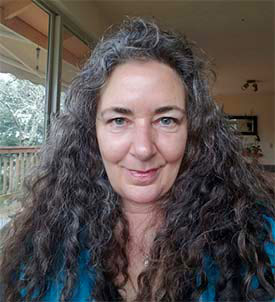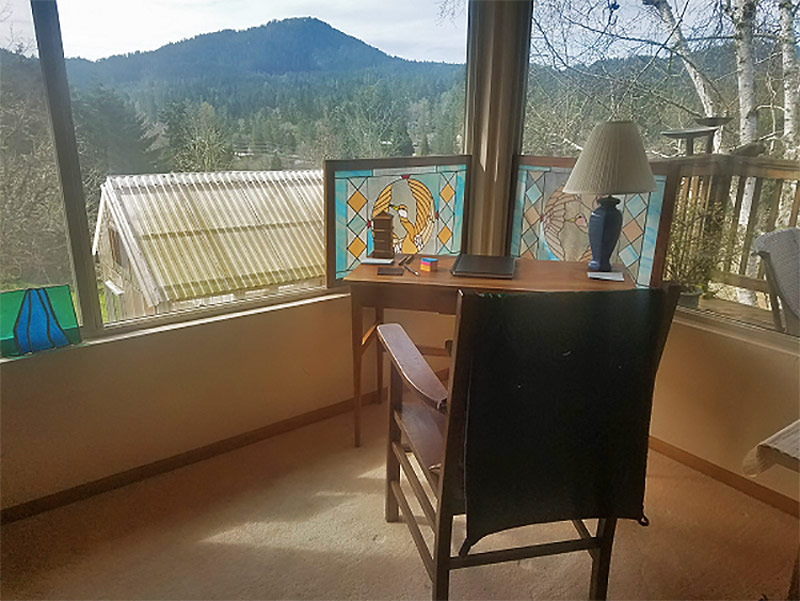Six months ago, I resigned from a job working in a shabby cubicle with a stunning view to the east. I rarely turned around from my dual monitors to look out the window, not unless there was a rainbow or a police take-down at the transit station. Even then, I only turned because other staff rushed into my cube to lean against the credenza, chattering and pointing and leaving fingerprints on the glass. I spent too many years in different cubes, in hindsight all remarkably the same. I write at home now. I spend long moments lost, gazing out windows.
My writing desk is upstairs in the southwest corner of the house. Spencer Butte is framed outside the windows, looming sometimes, like an iceberg daunting the bow of a ship. This corner enclave is where I write longhand, with black ink in a book of unlined paper, on most mornings. I notice my handwriting has improved these past six months, where it was nearly illegible when I started the book. I thumb through the pages, and volumes, and see this practice has also given me a steadier line across the page.
I have a laptop computer, a tablet computer, and a smart phone, all with writing software installed. My computer desk, with the pullout keyboard tray, faces east onto our quiet residential street. Stationery, paper clips, stapler, highlighter, are to my left hand, organized on a short vintage hutch which was sanded down long ago, but somehow never painted again. I move back and forth from west to east, into the kitchen for toast, and more time looking out of windows. Several small enclaves are carved out for writing, some with post-it notes, some with power cords, all with windows. I move around toting the laptop like a serving tray, abandon it, take up the tablet. There’s a small notebook in the car; a pocket journal in my messenger bag. One should have options to jot, better ones than the back of a brew pub’s weekly specials menu.
Downstairs is for considering on things.
After mid-morning on our dead-end street, there’s too much noise upstairs to think. Our young female Labrador is loquacious. I have never encountered a dog that talks so much. Mercedes comments (loudly) on every cat, squirrel, and neighborhood child whacking a stick at the blackberries on the hill. She doesn’t need to see the perceived threat—she can smell through the walls and unopened windows. Mercy barks. The newspaper carrier arrived. She growls. A flock of wild turkeys are pecking out on the verge. She sings a haunting whale song to roust me out of bed in the morning. The dog has an impressive vocabulary. It is distracting, an understatement. A barking dog, and a crying baby, are both devilishly engineered by nature to disrupt attention. Somehow I drafted a 200-page manuscript in my upstairs enclaves, with regular disruptions for Mercy’s commentary. For weeks, I acknowledged the same mail truck that arrives six days out of seven. Finally, I conceded to the basic nature of the dog. The dog will talk.

I carved out a sheltered enclave in the small guest bedroom downstairs. The windows face the backyard and the diversions on the street upstairs are muffled. I cobbled together a studio. I brought in a sturdy campaign table to serve multiple functions: it is suitable for writing, wrapping packages, or wrestling outside to act as a picnic table. The light fixture reminded me of my childhood bedroom. The more I noticed it, the more I hated it. When I stared up at the square frosted glass etched with ferns, I thought of sticky yellow walls and cheap fish sticks. I found a rubbed bronze fixture, with amber glass and New Orleans style, to gentle the overhead light.
I bought a candle chandelier from a shabby chic vendor and hung it in the corner of the room. I filled it with three LED lights that fake-flicker like real candles, but without the danger of fire when I forget to extinguish them. I will forget. One day soon, I’ll run the batteries down. Since I aspire to write like a gypsy vagabond, I wanted an enclave outfitted with some spare graces of a bordello. Whilst considering on things, the muse is enticed over the windowsill, never the door’s threshold. She’s not fond of barking dogs. After many long years transfixed inside cubicle walls, I find I must wander to write.

Kim K. McCrea attended the Robert D. Clark Honors College and received her BA in English from the University of Oregon. Kim worked as a Systems Analyst in IT for over 20 years before returning to literature and letters. Kim recently won the Silver Creek Writers Residency/Treefort Wild West Prize for Creative Nonfiction. She was twice named a finalist for the Oregon Quarterly Annual Essay Contest. Kim is a licensed Nia instructor living in Eugene, Oregon, with her husband and dog, Mercedes.
3 Questions with Kim K. McCrea:
TD: Who is your greatest influence?
KM: One day in high school the English teacher read T.S. Eliot. It was “The Love Song of J. Alfred Prufrock.” I was smitten. It was a brilliant bell in adolescent fog to aspire to ever write like that. I didn’t care what the poem meant, it was new music. There have been so many important influences, yet I’ve never forgotten the day I first heard Prufrock.
TD: Favorite word?
KM: Right now my favorite word is “peregrine.” I’ve had it written on a post-it note for a couple weeks. There is a sense of wilderness about it that also evokes the name of the falcon. It literally means “from beyond the fields/grain.” One day I’ll work it into a sentence, so I can move on.
TD: Do you have a favorite reading ritual?
KM: This winter I developed a ritual of brewing vanilla chai. I have a big insulated travel cup that keeps it warm while I’m reading and feels bottomless.



COMMENTS ARE OFF THIS POST